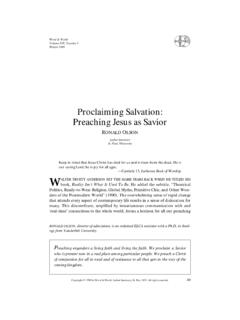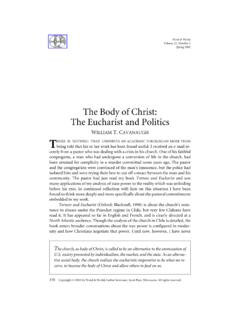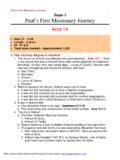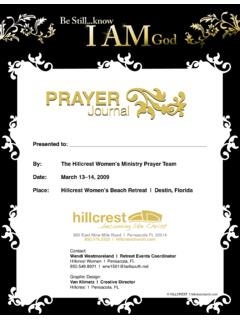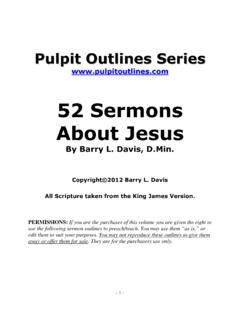Transcription of The Funeral Sermon: Remembering the Deceased - Word …
1 The Funeral sermon : Remembering the DeceasedGARYDREIERLet me state at the outset that the primary purpose of a Funeral sermon is topraise God. The letter to the Ephesians makes it clear that our veryraison d treis to praise God (Eph 1:12). Everything we do has one focus: praise. More, Paultells us that there is but one thing he wishes to know: jesus Christ, and him cruci-fied (1 Cor 2:2).In Matthias Gr newald sIsenheim Altarpiece, John the Baptist stands point-ing to jesus . John s pointing finger is curiously large and out of proportion to therest of his s vocation was to point. Ours is as well to point and topraise. There may never be an occasion as important for such pointing as a we can and must proclaim the Living One who defeated death and welcomesus all from this life into being duly granted, I propose that Funeral sermons ought liberally tospeak well of the Deceased .
2 To eulogize, however, is not to lie. A few years ago I wasat a Funeral of a relative who was, to tell the truth, a cranky old man. When the pas-tor began his sermon with the assertion that the Deceased was a kind and graciousperson, the family actually laughed; they were unlikely to believe anything else thatpastor Scott Card, in his novelSpeaker for the Dead,describes someone who iscalled on to speak for the dead, someone who was expected to research andknowthe speaker was expected to tell the truth, the whole truth, andwholly name the person for all the person was. Wonderfully, therapeutically, andcompassionately, the speaker was expected to recall and assess the Deceased per-son s should do similarly. A good Funeral sermon begins days before the fu-neral with the pastor carefully listening to the principal mourners.
3 The pastor maynot have known the Deceased , but by the time of the sermon , the family and friendsmust be able to feel that the pastor understood, that the pastor got it right. I sug-80 Copyright 2014 by Word & World, Luther Seminary, Saint Paul, Minnesota. All rights & WorldVolume 34, Number 1 Winter 20141 See :Mathis_Gothart_Gr (accessed November19, 2013).2 Orson Scott Card,Speaker for the Dead(New York: Tor Books, 1986).(continueed on page 82)81 The Funeral Sermon: Proclaiming the GospelJOHNE. QUAMWhat should a Funeral be? Is it thanksgiving for life or, as it is often termed, a celebration of the life of the Deceased ? Or is it to be a proclamation ofhope, a telling of the gospel of resurrection in jesus Christ? Since, especially forreaders of this journal, the Funeral will be understood as a service of Christian wor-ship, this strongly suggests an emphasis on the proclamation of the gospel of hopethrough our savior jesus course, the Funeral is a service for a person who is remembered and oftenhonored by the many who attend the Funeral .
4 It would be very strange were thereno mention or remembrance of the Deceased . Our worship includes thanksgivingto God, including thanks for the gift of the one who has died, often with some spe-cific celebration of life theme has, however, become commonplace thesedays. I often wonder if it derives from another contemporary commonplace,namely, that everyone is going to heaven. Why? Perhaps this is a form of universal-ism, but I have even heard Funeral sermons that seem to imply that the Deceased isgoing to heaven because she has done so much good during her lifetime certainlynotour understanding of the gospel!In my pastoral experience, the thanksgiving for life sermon often becomesredundant. The service has already typically included a word of remembrance byone or more family members.
5 Some of these words frequently last as long as halfan hour or more, even though we have agreed together on the necessity of brevity,particularly in consideration of the many older persons who will be at the , if I refer to some facts about the Deceased , I must preface them with as youjust heard his daughter Of even more importance, regarding the Funeral as celebration often over-looks the pain and loss for the family and friends of the person who has died. Thedeath is regularly described as a good thing by the use of the statement, He is in abetter place. But the sense of loss will come quickly. The changed family routineswill be a constant reminder of loss. The many and varied feelings of grief will have(continued on page 83)gest that the sermon itself start by speaking honestly and compassionately aboutthe dead.
6 To eulogize, tospeak well, in this context does not mean that we simplysay nice things. It means we have taken the care to speak well as we caringly speakabout the whystartwith the dead instead of the Living One? (Perhaps you hear anangelic objection: Why seek the living among the dead? ) I have been doing fu-nerals for over thirty-two years. I have also been a mourner at too many funerals. Ican tell you that when mourners enter the worship area for a Funeral , their mindsare full of the person they are mourning. They are flooded with memories, plaguedwith associated grief, frightened of a life without their loved one, and full of re-membered joys for the one they can no longer be with. To hear nothing but jesus -talk would feel like being pelted with platitudes by a pastor who was clueless abouttheir real life and very real need to meet the grievers where they are.
7 We need to start with what fillstheir minds. We need to start with the Deceased . When we have taken the time tolisten carefully to the mourners prior to the Funeral , when we take notes and actu-ally quote the mourners, they will hear the sermon . They will feel the Deceased feel heard and understood. And having heard the truthabout the dead one, they will trustingly be more receptive and eager to hear aboutOne who is the truth and the have found the best way to gently guide the minds of the mourners towardJesus is by saying what good can be said about the Deceased . Then we can let the lifeof the dead begin to point to the death of the Living One. We can meet the mourn-ers where they are in their grief and gently help them turn their eyes upon is nothing new here.
8 This is the age-old missional movement. Paul waswilling to be all things to all people (1 Cor 9:22) and eager to meet Athenianswhere they were (Acts 17:22). Good missionaries throughout the centuries havefirst taken the time to learn the language, the music, and the culture of the peoplethey are seeking to missional pastors must first take the time to learn about the Deceased ,the language of the grieving ones, and the culture of their family. Then they canlovingly, gently, point to jesus . When we avoid the Deceased , we awkwardly evenuncaringly fail to meet people on their level. Pastors who fail to eulogize are likepastors who try to greet their twenty-first-century audience with sixteenth-centuryarguments, seventeenth-century language, and nineteenth-century hymns.
9 Theyfail to know their audience. They fail to love their people. When that happens, itbecomes difficult to point, to must be caring speakers for the dead so that we can be faithful speakersfor the Living DREIERis seminary pastor and director of Christ Chapel at Lutheran Theological South-ern Seminary, Columbia, South The Funeral Sermon83 Quam The Funeral Sermontheir effect. Should not the Funeral provide some help for the present and oncom-ing grief as well as some good memories of what was?Along with all those memories, the reality before us is a casket containing adead body or a tiny urn containing all that is left of a human being, a loved one. Weare still left with the question, Is this the end? Is there more? If there is a betterplace, should not the sermon tell that story?
10 The message of the Funeral is still thegospel of jesus Christ. Most of those we serve at the Funeral have been promisedthat in baptism they died with Christ and rose with him (Rom 6:1 5; Col2:11 12). Many of the memories of the dead person recall that he or she has livedthis promised life. They lived as they did in the assurance that the trumpet shallsound, and the dead shall be raised incorruptible (1 Cor 15:52 KJV).The family that has lost a loved one needs to be assured that the death they seebefore them is not really the end. There is more. There is resurrection because Jesusdied and rose from the dead. There will be a new day, a day of resurrection pre-pared by jesus in his victory over sin and death the Easter recognizing the loss and grief that the family and friends have experienced,there is a need to assure them that they are not alone.

